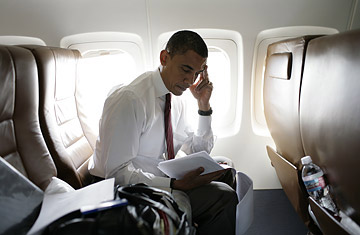
Senator Barack Obama looks over a speech on his campaign plane
Even though the details remain sketchy, it's clear that Barack Obama's upcoming trip to the Middle East and Europe is an audition on the world stage. But the most important critics will not be the foreign leaders who will be sizing him up as a potential member of their ranks or the cheering throngs that are likely to greet him at every stop. The audience that matters most will be the voters back home, where many Americans have yet to be convinced that this young man of relatively little experience is the right person to fill the role of their Commander in Chief. "This," says Ken Duberstein, who was Ronald Reagan's White House chief of staff, "is an absolute opportunity to get over the acceptability threshold."
Polling suggests that Obama still has a way to go in that regard. In the latest Washington Post/ABC News survey, only 48% of registered voters said Obama would make a good Commander in Chief, with an equal percentage saying he wouldn't. By comparison, 72% said John McCain would be a good one.
The campaign has thus far provided only the barest outline of his itinerary. On Monday, Obama will be in Amman, Jordan; on Tuesday and Wednesday, Israel and the Palestinian territory of the West Bank. Thursday, Friday and Saturday will be a sprint across Europe, with stops planned for Berlin, Paris and London. And somewhere in all this, Obama plans to make a much-anticipated visit to Iraq and Afghanistan with two Senate colleagues, Democrat Jack Reed of Rhode Island and Republican Chuck Hagel of Nebraska.
Every step of Obama's trip will be as fraught with symbolism as it will with substance. The biggest public event will be a speech in Berlin, though the Obama campaign has yet to say whether he will give it at the historic Brandenburg Gate, near the former site of the Berlin Wall. (Campaign staffers reportedly were looking for alternate sites after Chancellor Angela Merkel expressed her displeasure about the prospect of a presidential candidate speaking where Ronald Reagan in 1987 demanded, "Mr. Gorbachev, tear down this wall!") Campaign officials are not even divulging which officials Obama plans to meet with, though some details have begun to leak. A diplomatic source tells TIME that King Abdullah II of Jordan plans to press Obama to promise that, if elected, he would place a higher priority than Bush has on the Arab-Israeli peace talks. (The presence in Obama's entourage of Dennis Ross, the lead negotiator in those talks for Bill Clinton and George H.W. Bush, is a signal that Obama is thinking along the same lines.) In Israel, the New York Times has reported, he will meet with President Shimon Peres, Prime Minister Ehud Olmert, Defense Minister Ehud Barak, Foreign Minister Tzipi Livni and the head of the opposition, Likud Party leader Benjamin Netanyahu. He is also expected to see Palestinian Authority President Mahmoud Abbas in the West Bank city of Ramallah.
All indications are that Obama can expect an exuberant welcome wherever he goes, but that can be a double-edged sword. It didn't help John Kerry that Europeans seemed so eager to embrace him. In a famous put-down, then Commerce Secretary Don Evans declared that Kerry "looks French." For his part, Obama has already been portrayed by opponents as an out-of-touch élitist (see "Bittergate"), and recently McCain surrogates such as Mitt Romney and Rudy Giuliani have suggested that the Democrat has more of a European worldview than the Arizona Senator does.
After eight years of go-it-alone foreign policy, however, that line of attack may not be successful. In a June poll by the Pew Research Center, 71% of respondents said they believe the U.S. is less respected in the world than it used to be; for the first time since Pew began asking that question in 2004, a majority said they view this loss of international respect as a major problem.
Regaining some of that international respect (and admiration) is one thing. But just as crucial for Obama is whether all the diplomatic theater can persuade American voters that he is capable of taking the helm of a superpower. That depends, to some degree, on how comfortable Obama seems standing shoulder-to-shoulder among those he would be dealing with as this country's President. "It's not a knowledge quiz. It's more visceral than that," says Council of Foreign Relations president Richard Haass, who was director of policy planning at the State Department during the early years of George W. Bush's presidency, and also served as a top official on his father's National Security Council staff. "Americans need to have a sense that this person can hold his own."
And doing that means showing, in his words and interactions overseas, that he is no pushover. "We would like to demonstrate in this trip his comfort and his capacity to deal with the serious challenges that face this country — that he's comfortable and he's sure-footed, and he knows what he is doing," says one of Obama's foreign policy advisers.
But that is, in many ways, little more than stage management. What will be far harder to discern will be what Obama himself is getting out of his trip. As Haass notes, "The real question is what he learns and ultimately incorporates into his thinking."
